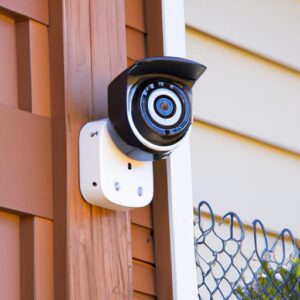Introduction
In today’s fast-paced business landscape, safeguarding your assets is paramount to success. But what exactly are security systems for businesses, and why are they crucial in the modern era? Let’s delve into the essence of these systems and explore the significance they hold in protecting your enterprise.
Definition of Security Systems for Businesses
Security systems for businesses encompass a range of technologies and measures designed to enhance the safety and security of commercial premises. These systems include surveillance cameras, access control systems, intrusion detection systems, alarm systems, and fire detection systems. By integrating these solutions, businesses can fortify their defenses against potential threats and risks.
Importance of Implementing Security Systems in Business Environments
The implementation of security systems is not merely a precautionary measure; it is a strategic investment in the longevity and resilience of your business. In an era rife with cyber threats, theft, and vandalism, having robust security measures in place is non-negotiable. By proactively securing your premises, you not only protect your assets but also instill confidence in your employees and customers, fostering a safe and trustworthy environment conducive to growth and prosperity.
Types of Security Systems for Businesses
Surveillance Cameras
Surveillance cameras are a fundamental component of business security systems, providing real-time monitoring and recording of activities within and around the premises. These cameras act as a deterrent to potential intruders and enable businesses to maintain a watchful eye on their property at all times.
Access Control Systems
Access control systems regulate entry and exit points to business premises, allowing authorized personnel to enter while restricting unauthorized individuals. By implementing access control systems, businesses can enhance security, prevent unauthorized access, and track the movement of employees and visitors within the facility.
Benefits of Access Control Systems
- Enhanced security through restricted access
- Improved accountability and tracking of individuals
- Integration with other security systems for comprehensive protection
Intrusion Detection Systems
Intrusion detection systems are designed to detect unauthorized entry or suspicious activities within the premises. These systems trigger alerts or alarms when unusual behavior is detected, enabling businesses to respond promptly to potential security breaches.
Key Features of Intrusion Detection Systems
- Motion sensors for detecting movement
- Glass break detectors for identifying forced entry
- Integration with alarm systems for immediate response
Alarm Systems
Alarm systems are critical in alerting businesses to potential threats or emergencies, such as break-ins, fires, or environmental hazards. These systems emit audible and visual alerts to notify occupants and authorities, enabling swift action to mitigate risks and protect assets.
Advantages of Alarm Systems
- Immediate notification of security breaches
- 24/7 monitoring for round-the-clock protection
- Integration with emergency response services for rapid assistance
Fire Detection Systems
Fire detection systems are essential for early detection of fire hazards and smoke within business premises. By swiftly identifying potential fires, these systems enable businesses to evacuate occupants, minimize property damage, and prevent catastrophic losses.
Importance of Fire Detection Systems
- Compliance with fire safety regulations
- Protection of lives and property
- Integration with sprinkler systems for automated fire suppression
Benefits of Security Systems for Businesses
Protection of Assets
Investing in security systems provides a robust shield for your valuable assets. Whether it’s merchandise, equipment, or intellectual property, these systems act as a deterrent against theft and unauthorized access, safeguarding your resources from potential harm.
Prevention of Theft and Vandalism
With security systems in place, businesses can deter criminal activities such as theft and vandalism. Surveillance cameras, alarm systems, and access control measures serve as deterrents, reducing the likelihood of unauthorized intrusions and criminal acts that can compromise the integrity of your business.
Monitoring of Employee Activities
Security systems not only protect your assets from external threats but also enable you to monitor internal activities. By tracking employee movements and interactions, businesses can ensure adherence to company policies, identify potential security risks, and maintain a secure work environment conducive to productivity and professionalism.
Compliance with Regulatory Requirements
In today’s regulatory landscape, businesses are required to adhere to specific security standards to protect sensitive data and ensure customer privacy. Implementing security systems helps businesses meet these requirements, demonstrating a commitment to data protection and regulatory compliance that instills trust among stakeholders.
Peace of Mind for Business Owners
Ultimately, security systems offer business owners peace of mind, knowing that their premises are safeguarded 24/7. By investing in comprehensive security solutions, owners can focus on driving business growth and innovation, knowing that their assets, employees, and customers are protected from potential threats and risks.
Factors to Consider When Choosing Security Systems
Size and Layout of the Business Premises
The size and layout of your business premises play a crucial role in determining the type of security systems that will best suit your needs. Larger premises may require more extensive surveillance coverage, while smaller spaces may benefit from targeted access control systems. Understanding the layout of your premises can help you optimize the placement of security devices for maximum effectiveness.
Budget Constraints
Budget constraints are a common consideration for businesses when selecting security systems. It’s essential to strike a balance between cost and quality to ensure that you invest in solutions that provide adequate protection without breaking the bank. By conducting thorough research and obtaining multiple quotes from reputable providers, you can find security systems that align with your budgetary constraints while meeting your security requirements.
Specific Security Needs of the Business
Every business has unique security needs based on its industry, location, and operational characteristics. When choosing security systems, consider the specific threats and vulnerabilities that your business faces. For example, retail businesses may prioritize theft prevention, while data-driven enterprises may focus on cybersecurity measures. Tailoring your security solutions to address your specific needs can enhance the overall effectiveness of your security strategy.
Integration with Existing Systems
For businesses with pre-existing security infrastructure, compatibility and integration with existing systems are essential factors to consider. Ensure that your new security systems can seamlessly integrate with your current technology stack to avoid operational disruptions and maximize efficiency. By leveraging integrated security solutions, you can create a cohesive security ecosystem that enhances overall protection and streamlines management processes.
Scalability and Future Expansion Possibilities
As your business grows and evolves, your security needs may change. When selecting security systems, consider their scalability and future expansion possibilities. Investing in flexible solutions that can adapt to your business’s growth trajectory ensures long-term value and minimizes the need for costly system upgrades down the line. By prioritizing scalability, you can future-proof your security infrastructure and maintain optimal protection as your business expands.
Best Practices for Implementing Security Systems
Conducting a Thorough Risk Assessment
Before implementing security systems, it is imperative to conduct a comprehensive risk assessment tailored to your business needs. By identifying potential vulnerabilities and threats specific to your industry and location, you can develop a customized security strategy that addresses the most critical areas of concern.
Choosing a Reputable Security System Provider
Selecting a reputable security system provider is key to ensuring the effectiveness and reliability of your security measures. Look for providers with a proven track record of delivering high-quality solutions and excellent customer service. By partnering with a trusted provider, you can rest assured that your security systems are in good hands.
Training Employees on Security Protocols
Your security systems are only as strong as the people who operate them. It is essential to provide thorough training to your employees on security protocols, including how to use the systems effectively and respond to security incidents. By empowering your team with the knowledge and skills they need, you create a proactive security culture within your organization.
Regular Maintenance and Updates of Security Systems
Security systems require regular maintenance and updates to ensure optimal performance and reliability. Schedule routine inspections, software updates, and equipment checks to identify and address any potential issues proactively. By staying on top of maintenance tasks, you can prevent system failures and ensure continuous protection for your business.
Testing Security Systems Regularly
Regular testing of security systems is essential to verify their functionality and effectiveness. Conducting routine tests, such as alarm drills and system checks, allows you to identify any weaknesses or malfunctions and address them promptly. By regularly testing your security systems, you can maintain peak performance and readiness to respond to any security threats effectively.
Conclusion
In conclusion, security systems for businesses are not a luxury but a necessity in today’s volatile business landscape. By investing in the right security solutions, you are not only protecting your assets but also safeguarding the future of your enterprise. Remember, security is not just about preventing external threats; it’s about creating a sense of security and peace of mind for all stakeholders involved.
As you navigate the realm of business security, keep in mind that every decision you make regarding security systems plays a crucial role in shaping the resilience and reputation of your business. So, take the time to assess your security needs, choose reliable providers, and stay proactive in maintaining and updating your security systems. By doing so, you are not only protecting your bottom line but also reinforcing your commitment to excellence and trustworthiness in the eyes of your employees and customers alike. Stay secure, stay vigilant, and watch your business thrive in the face of any challenge.




